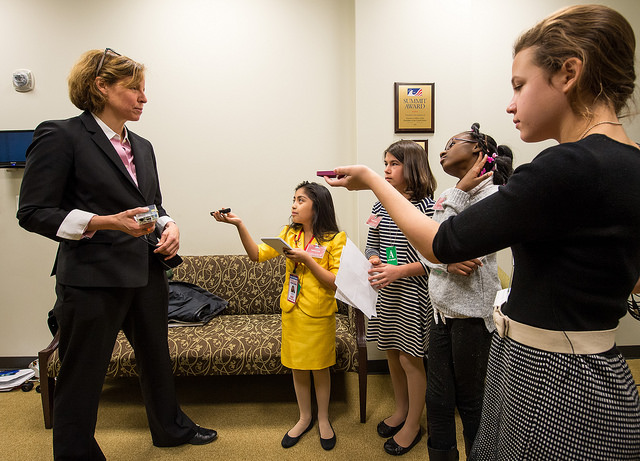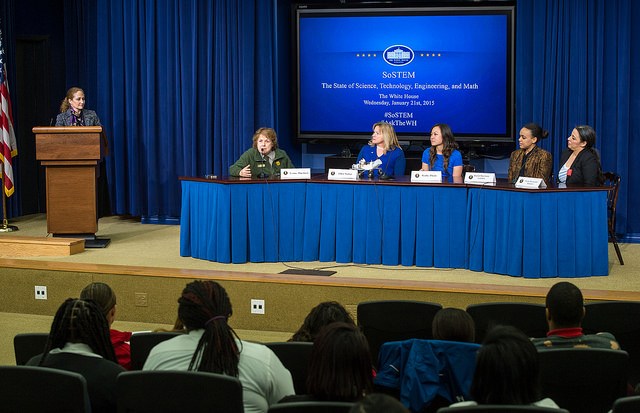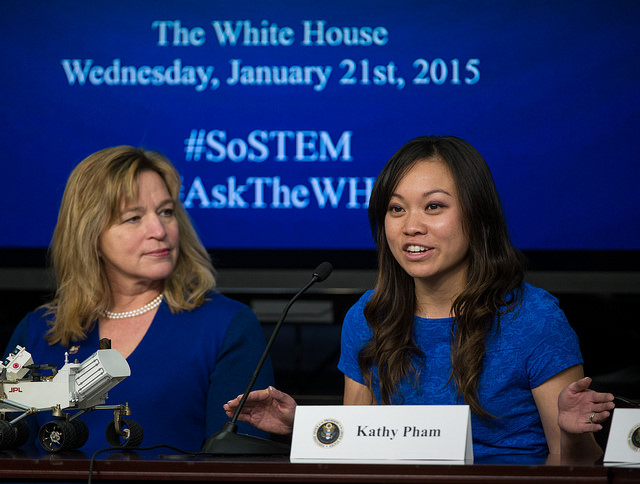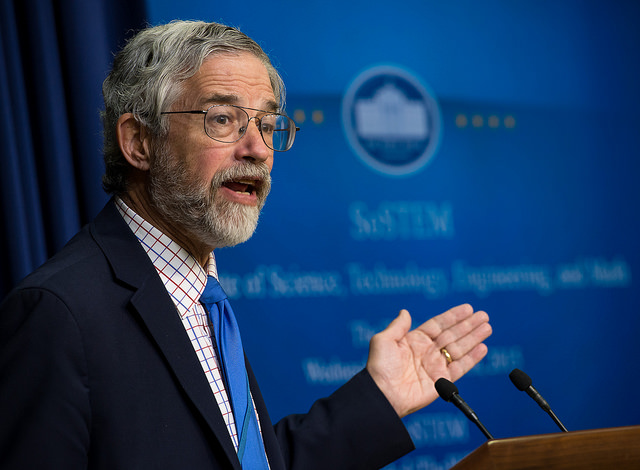
Yesterday, the U.S. Chief Technology Officer, Megan Smith, kicked off an afternoon of conversation between senior Obama-Administration scientists and technologists, outside innovators, and one of the toughest, most inquisitive audiences that could be conjured: DC-area elementary, middle, and high-school students.
CTO Smith launched the event by recapping the multitude of science and technology references in the prior evening’s State of the Union Address—including STEM education, climate change, tech-skills, and space exploration, to name a few. She then shared a personal account of the beauty of being a techie in public service, and the importance of bringing all of America’s talent to the table when it comes to science, technology, engineering, and math (STEM) careers – especially including women and minorities.Next, NASA Administrator (and former astronaut… and former Marine) Charlie Bolden took the stage, revving the kids up for a special surprise: a live video Q&A with astronauts currently in space aboard the International Space Station (ISS). Students eagerly lined up to ask about life in zero-gravity, how the astronauts got their awesome jobs, and even what the weather’s like up in space. (Captain Barry "Butch" Wilmore half-joked that the weather is “consistently clear” aboard the ISS, just one of the many perks of his job.) Wilmore was joined by Colonel Terry Virts, and Captain Samantha Cristoforett, who answered students’ questions one-by-one, all while sporadically flipping upside down in their gravity-free environment.
Next up was OSTP Associate Director Dr. Jo Handelsman, who proudly confessed her earliest true love: microbes (after seeing her first paramecium at school, she saved up six-months worth of babysitting money to buy her first microscope!). Handelsman explained that while microbes often get a bad rap for making people sick, the large majority of them, in fact, help keep people healthy. She also talked about the ways that bias might affect women in STEM fields, emphasizing to students that no matter what anyone may tell them, “Anyone can be a scientist. It just takes hard work and wanting to do it.” Moments later, there was living proof right on stage, when the students were greeted by a panel of accomplished female STEM all-stars, who fielded questions about what motivates them, who inspires them, and what challenges they’ve faced while getting to the top of their STEM fields. National Park Service Ranger Lynne Murdock shared that, in a predominately male field, she has found that having a “different perspective” has helped her achieve a number of important goals in the course of her work (which, by the way, includes scouting for whales, leading trail hikes, and working around glaciers).Students also heard from Presidential Innovation Fellow Rachel Harrison-Gordon and U.S. Digital Service data guru Kathy Pham (who joined the First Lady at State of the Union). Two high-schoolers from the Francis L. Cardozo Education Campus asked for tips on how to refine a mobile application they created (figure out what the deficiencies are in your competitors’ product, and then look to correct them, was Gordon’s advice).
Chief NASA Scientist Dr. Ellen Stofan asked the audience who would want to go to Mars if given the opportunity, and a sea of hands responded. Even the small corps of kid-reporters covering the event indicated aspirations to take their journalistic talents to space.And Panelist Nicole Hernandez Hammer—sea-level-rise scientist, and fellow guest of the First Lady at State of the Union—shared that climate change will surely be an area of STEM expertise that is in demand for the next generation, and encouraged students to do their part to learn about the challenge.
Finally, President Obama’s Science Advisor, Dr. John Holdren, concluded the day with an inspiring accounting of the ways in which President Obama truly “gets it”, when it comes to the power of innovation, rattling off a slew of examples of the President's commitment to STEM: launching the first-ever White House Science Fairs and Maker Faires, becoming the first President to write a line of code, inviting TV meteorologists to talk climate science at the White House, and more. We clearly have a President who understands the power of STEM, Holdren said, and experts within and outside government – and all across the country – who are doing amazing work too keep our Nation on the cutting edge.
Then he looked out into the audience of students, “YOU are the ones who will keep America innovating toward discoveries that we can’t even dream of today, and toward solutions to some of the world’s most important problems.”With that, there was applause, and final words from Dr. H: “class dismissed!”
For more about what the Obama Administration is doing to inspire the next generation of STEM innovators, stay tuned right here, and follow @whitehouseostp on Twitter. To see more of NASA's photos of the event, visit here. Missed SoSTEM? That's ok - watch the whole thing here.
Becky Fried is Deputy Assistant Director of Strategic Communications at the White House Office of Science and Technology Policy
Meredith Lightstone is a Communications Intern at the White House Office of Science and Technology Policy






